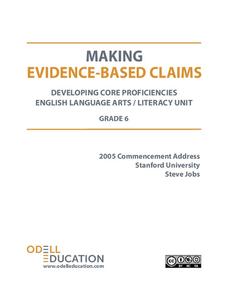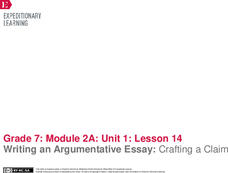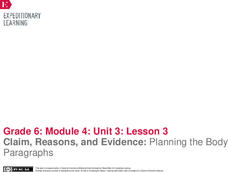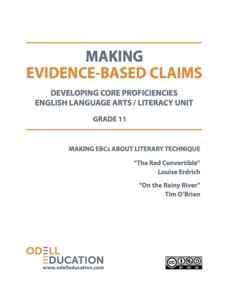EngageNY
Analyzing the Central Claim and Supporting Claims: “The Shakespeare Shakedown”
Scholars continue to analyze Simon Schama's article "The Shakespeare Shakedown." They participate in a jigsaw discussion to identify the author's argument and supporting claims. Pupils also write objective summaries of the text.
Curated OER
Is That a Fact?
Investigate popular scientific claims and gather evidence to defend or argue against an author's stance. Writers synthesize information and compose their own "Really?" columns modeled after those found in the weekly "Science Times"...
EngageNY
Forming a Research-Based Claim: Cascading Consequences Chart
Can you put that in writing? Scholars work with a partner to write a practice claim before writing their own claims. After writing their claims, learners share with class using a Concentric Circles activity.
Bright Hub Education
Using Evidence and Supporting Details in Writing
In expository writing, it is important to back up claims with evidence and details. Help your class to develop their writing with notes on different types of evidence. Once they have the basics down, practice with a sample thesis and...
NASA
Introduction: Building Claims from Evidence
Making a claim without supporting it has little value. Learners work on their claim-making skills in a well-designed lesson. They view still images from a video and make claims using support from the visual representations. They then...
Odell Education
Making Evidence-Based Claims: Grade 9
Sorry, Charlie. Scholars take a close look at Apology by Plato. Activities analyzing the text help pupils understand, make, organize, and write about claims. Learners work in groups, complete claim tools, and evaluate thinking by filling...
Odell Education
Making Evidence-Based Claims: Grade 6
In order to make evidence-based claims, one must be able to draw explicit information from text. From here, learners take that information, analyze the text to develop a deeper understanding, and connect with the information in order to...
Making Evidence-Based Claims: Grade 7
New ReviewThe most effective way to support an argument is with clear and relevant evidence. As seventh graders read and listen to Cesar Chavez's California Commonwealth Club Address, they work through five sections of a textual analysis unit,...
EngageNY
Making a Claim and Advocating Persuasively: Preparing for the Practice Fishbowl
Scholars consider their reading in The Omnivore's Dilemma to develop a claim answering the question, "Which food chain would you choose to feed your family—the local sustainable food chain or the hunter-gatherer food chain?" To guide...
EngageNY
Writing an Argument Essay: Evaluating the Model and Crafting a Claim (Chapter 28, Including Synthesis of Scenes in Previous Chapters)
Scholars use the model essay from the previous instructional activity to create their own argumentative essays. Readers make a claim about Atticus defending Tom in To Kill A Mockingbird. They then use graphic organizers to develop and...
EngageNY
End of Unit Assessment Parts 1 and 2: Evaluating Arguments and Claims
Which came first: the chicken or the egg? As part of the end-of-unit assessment for The Omnivore’s Dilemma, scholars watch a video about organic eggs versus conventional farm eggs. They use graphic organizers to collect evidence as they...
EngageNY
Writing an Argumentative Essay: Crafting a Claim
As scholars prepare to craft their essays based on Katherine Paterson's Lyddie, they learn about using compelling reasons in their writing. Next, they develop a claim about whether Lyddie should sign a petition to speak out against...
EngageNY
Claim, Reasons, and Evidence: Planning the Body Paragraphs
Planning is the key to success. Scholars continue planning their essays by adding reasons to their Planning My Argument graphic organizers. Additionally, pupils analyze a body paragraph from a model position paper, identifying the...
Curated OER
Don't Believe the Hype
Are hand sanitizers good for you? What about the environment? Research the science behind commonly used cold medicines. The class reads an article, creates a product poster, and conducts independent research on product claims made by...
Education Bureau of Hong Kong
Evaluating Casual Claims
Responsible decision making relies on the ability to a recognize, analyze, and evaluate claims. The worksheets and activities in this 32-page packet teach learners how to distinguish among opinions, reasoned arguments, facts, and logical...
EngageNY
Forming a Research-Based Claim: Creating Stakeholders Charts
Present the facts. Scholars create presentations of their research on DDT using their Cascading Consequences chart and a
Stakeholders Impacts chart as visuals. They discuss the term stakeholders and create a Stakeholders Impacts chart...
EngageNY
Making a Claim: Moon Shadow’s Point of View of the Immediate Aftermath
Body paragraphs are the building blocks of every essay. Pupils view and discuss a model essay using a rubric to evaluate one of its supporting paragraphs. Next, scholars use what they've learned to continue drafting their own literary...
EngageNY
Identifying How Text Features Support Arguments: “The Exterminator"
Half and half. Split the class in half to gain a full understanding of sidebars. Pupils work in groups to discuss sidebars in text. Half of the groups read Seriously Sick, and the other half reads Killer Genes. They read using...
EngageNY
Annotating the Text and Identifying Argument, Claims, and Evidence: “Double Whammy” Excerpt from “The Exterminator"
That's a double whammy! Scholars read the excerpt Double Whammy from The Exterminator. After identifying the gist of the text, they annotate by marking the author's claim. The group discusses what is meant by double whammy and complete...
Curated OER
States and Mates
Discuss and reflect on the concept of allies and alliances. The class examines the competition between the United States and Venezuela. Using the New York Times, they search for examples of geopolitical alliances. In addition, they write...
Odell Education
Making Evidence-Based Claims Literary Technique: Louise Erdrich and Tim O’Brien
Take a ride in The Red Convertible by Louise Erdrich. Students read the story and discuss whether a car is really a character. After carrying out several activities using graphic organizers and tools for making their claims in The Red...
Odell Education
Making Evidence-Based Claims: "The Souls of Black Folk" by W.E.B. Du Bois
Scholars dig deep into the text of W.E.B. Du Bois The Souls of Black Folk and analyze his position that black people must be aware of how they see themselves as well as how the world sees them. The instructor and readers work through the...
EngageNY
Scaffolding to Essay: Using Details to Support a Claim
Show me the evidence. Writers analyze the Command of Evidence row of the rubric for A Long Walk to Water essay. Pupils work in pairs to determine how the writer of a model essay meets the demands of the rubric. They then use a Forming...
EngageNY
Using Multimedia in Presentations: Preparing to Present Claims
Time to wrap it all up! Using facts, details, and examples, pupils present their claims about whether the American Academy of Pediatrics should increase its screen time recommendations. They incorporate a multimedia visual display and...

























